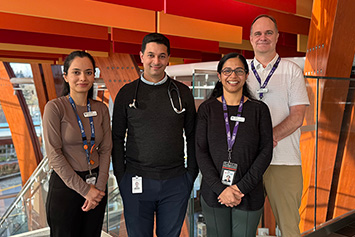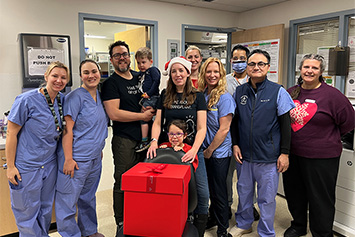
Social prescribing refers older adults to a range of local, non-clinical services to address their wellness needs.
Sandi Temple knows aging is inevitable. What isn’t inevitable is that we won’t age well.
Sandi is a seniors’ community connector with Maple Ridge Community Services. She connects older adults with important social and recreational programs, food delivery services, transportation and housing supports.
Her role is a key part to a new approach to healthy aging. Social prescribing is a Fraser Health program, led in partnership with United Way, and facilitated through community organizations across the health care region. Similar to social prescribing programs available in the United Kingdom, it enables health care professionals to refer older adults to a range of local, non-clinical services and seeks to address people’s unmet needs that may be impacting their well-being.
A client is connected to a seniors’ community connector, like Sandi, and together they develop goals aimed to support their health, preferences and needs.
“I have a lot of clients who are themselves caregivers,” says Sandi. “Their spouse may have Alzheimer’s or dementia and they are overwhelmed, lonely and isolated. Once they are signed up, it’s easy for me to help both them and their partner gain access to the services they need.”
The vision of the social prescribing program is for seniors to age in place and stay connected with their communities.
“We are learning that social isolation is very detrimental to health,” says Dr. Grace Park, regional medical director for Fraser Health Home and Community Care. “The health equivalent is smoking 15 cigarettes per day, in terms of health outcomes. Connecting vulnerable clients to like-minded people, activities that bring them joy, physical exercise, and relevant social supports have shown to improve health and quality of life.”
The program also hopes to shift the conversation around health care to include both medical and social care.
“This is an asset-based, person-centred, and proactive approach that goes beyond treating illnesses,” says Margaret Lin, project lead with Fraser Health’s Community Action and Resources Empowering Seniors (CARES) program. “It recognizes older adults as not just patients with needs, but as community members with gifts to share, while supporting them to engage with and contribute back to their communities.”
The social prescribing program is available for any older adult who could benefit from tailored support and resource connection. Throughout Fraser Health, referrals can be made by primary care practitioners, assisted living providers, community nurses, social workers, allied health professionals, and acute care staff. Older adults can also self-refer to the program.
Margaret also believes that programs like social prescribing are needed to establish important connections and collaboration between older adults, health care providers, allied team members, health authorities and community organizations.
“Together we can build a healthy ageing environment,” she says. “We welcome everyone to appreciate the diversity of ageing and the complexity of health and recognize that we can all be active members in healthy ageing promotion.”
Sandi sees the direct impact of this work, every day.
“When you start ticking the boxes of what a person needs for support – be it the food bank or their rent subsidized – you see their face come back to life. I ask them, ‘What do you need help with? What can I do to support you?’ And then I say, ‘Yes! I can do this. I can help.’”
Click here for more information on social prescribing.


